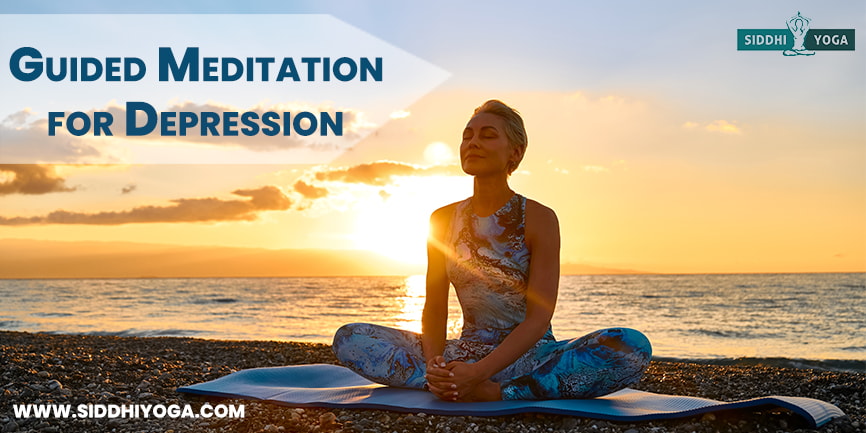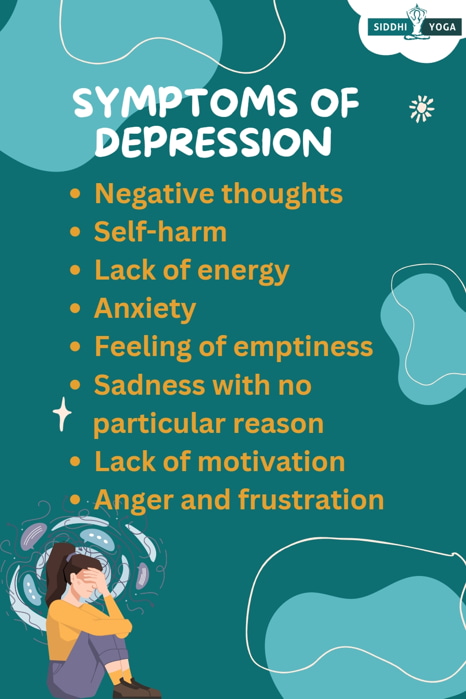
In this guided meditation for depression article, you will learn about some of the best-guided meditation scripts to overcome depression and anxiety.
Introduction
Meditation is a practice that has been passed on for generations and is today becoming a visible part of a daily self-care routine. People meditate for different reasons. No one reason is more valid or important than another. You are all welcome to meditate. For some, meditation is a tool to enhance their spirituality, reduce stress, become more aware of oneself, or guide through one’s body and mind when dealing with depression or anxiety.
Below we will go through some symptoms and causes of depression and how we can use guided meditation to ease and support us on our healing journey.
The Rate Of Depression Today
Depression, classified medically as a mood disorder, is a commonly known illness that impacts our mood, how we act and our thoughts and emotions.
The rate of depression is growing, not only among adults but also among teens and even children. Observation of such an increase in the incidence of depression and anxiety, already impacting the lives of younger generations, says something about our modern society. It is a sign to pause and take a closer look at one’s health, surroundings, daily routine and stress management.
Depression can vary from person to person in terms of symptoms, frequency and duration. Some may not even notice that they are dealing with depression if it happens sporadically. But we must recognize it when it happens. If not, it could lead to depression becoming more severe and rooted in our body and mind.
Below, we list some of the major symptoms of depression you should pay attention to in yourself and others close to you.
Some Symptoms of Depression:

- Feeling of emptiness
- Sadness with no particular reason
- Lack of motivation
- Anger and frustration
- Lack of concentration and focus
- Negative thoughts
- Self-harm
- Lack of energy
- Anxiety
- Change in eating habits (both lack or increase of appetite)
- Change in sleep routine (both sleep difficulties and sleeping significantly more)
If you detect any of the above-mentioned symptoms, you should consider seeing a medical professional and consult to see if there is a need for treatment. Psychological support will help someone going through a depressive episode or living with depression daily.
Meditation For Depression
Meditation and guided meditation for depression improve mental and emotional health. Not only does meditation focus on calming the mind and body, but it may also work more profoundly – showing and teaching new ways to construct our thoughts.
When dealing with depression, we might notice many intrusive, sad, insecure and harmful thoughts going through our minds. We might also notice emotional instability and a lack of motivation to do anything about it. When this becomes the reality we live in, it can lead not only to emotional and mental damage but also to health problems on a physical level. This is why it is so important to find time and space to relax, unwind and allow ourselves to delve deeper within ourselves.
Here you will find some powerful meditation practices which can be used when you notice depression setting in:
Becoming the Observer
A potent tool in meditation is to observe and look at ourselves, our thoughts and our emotions at arm’s length. It distances our true self from the negative experience we are having now.
It is not done to detach from our thoughts and emotions. On the contrary, it is performed to look at them with more objectivity. That will give greater clarity to what our mind and body are struggling with and how we can support ourselves.
Body Scan Meditation For Depression
A body scan is a well-known relaxation and embodiment practice that can help us, especially when dealing with depression and anxiety. Returning to the body and becoming more connected to our physical realm can bring us more calmness and stability.
Usually done with visualizations and breathwork, a body scan meditation for depression can be a great way to rewind at the end of the day or to prepare for bedtime.
Loving Kindness Meditation For Depression
Loving-kindness meditation focuses on creating feelings and thoughts of love and kindness towards others and yourself. It is a powerful practice and can help stimulate your mind to produce more caring and supportive thought patterns throughout the rest of the day.
Also, if you are going through depression, it might be easier to send kind emotions to your exterior relationships first to build towards that type of connection with yourself.
Breath Awareness Meditation For Depression
Becoming aware of the breath is a useful self-awareness and relaxation practice that can bring ease and calm to difficult moments. What’s more, it can be done anywhere and at any time. By noticing and keeping track of your inhales and exhales, your heartbeat calms down, the body becomes more relaxed, and the mind is more at peace.
Best Guided Meditation Scripts For Depression
Meditation scripts may be structured to focus on our mental health and depression. It is good to begin with such practices as a guided meditation for depression. This way we will be invited to learn how to transform our thoughts in a well-prepared meditation practice.
Below you will find our free guided meditations for depression:
Breath Awareness Free Guided meditation Script For Depression
Find a comfortable position on the ground with cushioning or on a chair. Roll back and relax your shoulders. Keep your spine erect but not tensed. Your head is light, softly reaching towards the sky.
Begin by paying attention to the natural rhythm of your breath. Do not change or judge the way you are breathing right now. Relax and observe how it flows naturally.
Listen to the sound of your breath. Can you hear it? Or is it silent? Can you notice a melody in your inhalation and exhalation?
Stay here for a few breaths and allow your body to enter a deeper state of relaxation and calmness.
You are present and safe to relax.
Slowly deepen and soften your breath. Begin to invite more air inside at a slower pace.
Notice the temperature of the room. Is it cool and refreshing? Can you imagine the color of the air you inhale? Is it the same when you exhale or does the color change? While breathing in, observe how the air is fresher and cooler and becomes warmer and denser while exhaling. Allow your breath to be a cleansing and regenerative practice for your body and mind.
You are present and safe to relax.
Again, deepen and relax your breathing so it feels comfortable and safe.
Now begin to notice which parts of your body move up with your inhale and which move out with your exhale. Relax your jaw and mouth and notice which area in your body moves up and down while you breathe.
Is it your chest and ribs? Maybe your abdomen and sides? Whichever part it is, relax and observe it with kindness. You are here, safe to follow your unique breath.
After a few moments, visualize the inhale going down towards your belly. Make it expand like a balloon and softly go down when you let the air out. Keep your shoulders still and send your breath lower into your abdomen.
You are present, safe to relax and fill yourself with fresh air and space.
Stay here, breathing gently and fully for as long as it feels comfortable. If any thoughts or emotions begin to arise, let them come. Invite each sensation that comes towards you and gently calm it with your conscious breath.
Om Shanti, Shanti, Shanti. May all living beings live happily and freely.
Positive Affirmations Free Guided Meditation For Depression
Find a comfortable position on the ground with cushioning or on a chair. Roll back and relax your shoulders. Keep your spine erect but not tensed. Your head is light, softly reaching towards the sky.
Begin by relaxing your facial muscles, your shoulders and your neck. Take a few deep and slow breaths to open up, calm down and get ready to follow the affirmations.
Repeat each of the following affirmations three times in your mind, slowly breathing in and out, with each repetition relaxing more and deeper.
I have the strength to take care of myself.
I have the right to take time for myself.
I am open to healing and change.
My rest and self-care are most important.
I have everything I need within.
I am compassionate towards myself and others.
I can take each day at my own pace.
I am allowed to feel sad and emotional.
I am allowed to feel happiness and joy.
I can trust my body and mind.
My mind is my companion.
My thoughts are calm and nourishing.
Depression does not define my essence.
My body is regaining strength with each day.
I am my entire life.
I surround myself with kindness and support.
I am not my depression.
I am free to be, think and feel what I wish.
I am strong and safe.
Keep breathing deeply and softly for a few minutes after repeating the affirmations. You are here, safe to relax, feel and open up spaces within you.
Om Shanti, Shanti, Shanti. May all living beings live happily and freely.
The Bottomline
Guided meditation and meditation can greatly help when dealing with depression, anxiety and feelings of sadness or emptiness. By reconnecting to our true selves, pure mind, body and emotions, we can gently reinforce the energy of life we deserve. Regular meditation can rewire and create new connections in our thought patterns, behaviors, and actions.
If you would like to learn more about the traditional methods and techniques behind meditation, you can also follow us and join our online meditation course, ‘Calm Your Spirit, Soothe Your Mind’ at Siddhiyoga.com